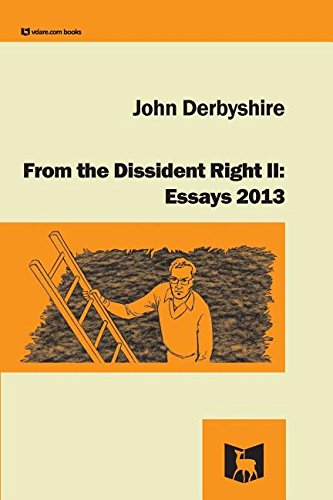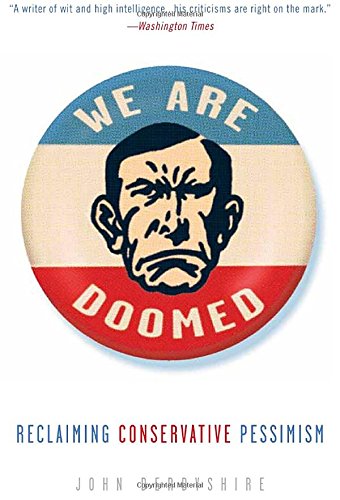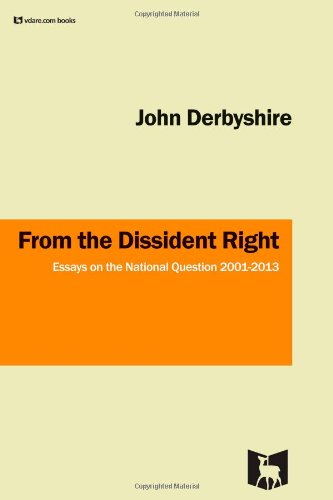MAY DIARY: Canada Road Trip; the Courage, Intelligence and Beauty of Faith Goldy; Deb's Days Numbered; ETC., by John Derbyshire
What better way to welcome summer than with a road trip? The Mrs and I closed out the month with a nine-day tour around Lake Ontario.
Kind friends in upstate New York allowed us to use their house as a base camp. We drove up there from Long Island, stayed overnight with them, then headed west to the Finger Lakes region, which has an astonishing quantity of wineries.
Who knew wine could be grown so far north? It’s something to do with proximity to the great lake, we were told across the counter at one of the several wine-tastings we attended. The lake somehow softens the climate enough to make the hardier varieties of vine commercially viable.
So a night at Belhurst Castle on Seneca Lake, then westwards into southern Ontario to stay with different friends in a small town there.
Canada is a major destination for bogus “refugees” and “asylum seekers” passed on to them by the United Nations. Government policy is to resettle as many as possible of these people in small towns like our friends’ rather than in big cities. Small towns are cheaper, the politicians more easily bought, the inhabitants more trusting and naïve. The U.S. government of course operates on similar principles.
So this pleasant, quiet little provincial town is on the front lines of Canada’s demographic revolution. Everyone has stories. Currently famous in the town is a “refugee” woman who has brought her (or “her”: Canada’s refugee programs don’t do DNA testing) eleven children. The whole family (or “family”) is of course on welfare.
Then east along the north shore of Lake Ontario and the great river for a night in Toronto, followed, after a 7½-hour drive, by two nights in Montreal; thence back down to Base Camp with our friends in upstate New York.
(When I first lived here in the early 1970s I worked in Westchester County, just north of New York City. I had a colleague who lived in Mahopac, twenty miles further north. With the geographical cluelessness of a newcomer, I once referred to my colleague’s house as being “upstate,” sending him into a fit of giggles. When he’d recovered he instructed me that “upstate” is w-a-a-ay further north than Mahopac. His wife’s family, he further explained, came from a town named Peru which is so far north, the family did their shopping in Montreal. “That’s upstate.” When you come from a small country, this one is really big.)
Toronto’s something of a non-place. I quipped to Mrs D that it is the Taipei of North America: that is, an important and populous city with nothing memorable in it to fix the traveller’s attention: no Eiffel Tower, no Statue of Liberty, no Sydney Opera House or Buckingham Palace or Tiananmen Square.
Yeah, yeah, there’s that big spindly thing; but that just confuses the place in one’s mind with Seattle. (And yeah, yeah, Taipei has the 101; but that’s just an office building for crying out loud. Zzzzzz.)
I of course mean no offense to the good people of Toronto, who treated us very hospitably. An old acquaintance of ours, a native of the place, gave up his time to act as our tour guide. He seemed to know colorful details about the history of every building in the downtown district. To him especially, many thanks.
I’m sure our Toronto guide won’t mind my saying that the high point of our visit to his city was dinner with Faith Goldy, the fearless young lady who ran for Mayor of Toronto last year on a Dissident Right ticket: demographic stability and equality under the law.
In other words, Faith’s platform stressed opposition to both unrestrained mass immigration and affirmative action. For that she was of course labeled with all the cuss words in the CultMarx playbook: “far right,” “white supremacist,” “extremist,” and so on.
De-platforming naturally followed—literally, for the first public debate among mayoral candidates. In spite of running third in the polls, Faith was not invited to the debate. She mounted the platform anyway, and had to be hustled off by security personnel. As I said: fearless.
In conversation, Faith was pessimistic about the possibility of any sanity penetrating Canada’s immigration policy. Her thoughts seem to be turning towards starting a family. (She recently married.)
Given her courage, intelligence, and beauty, I’d say that the loss to Canadian politics if she withdraws into private life would be more than compensated for by the gain to the larger gene pool. Still, I doubt the public sphere has seen the last of Faith Goldy.
Faith reminded me of the issue of Yellow Flight, which I have occasionally encountered in news stories from Toronto.
From the 1960s on, Chinese people settled in and around Toronto in great numbers. Some suburbs, notably Markham, became plurality Chinese.
In recent years lax immigration laws and the “refugee” rackets have brought more and more Sun People into these heavily-Chinese suburbs. Local Chinese have responded with protests and demonstrations. Now they are voting with their feet, to places further out—Yellow Flight.
The main thing you need to know about Montreal in 2019 is that it is the world capital of infrastructure repair. That 7½-hour drive from Toronto should have been six hours; but as we got close to Montreal there were détours and closed-off lanes everywhere. I have never seen so much construction work.
Our GPS went nuts, returning us again and again to the same spot after ten minutes of détours. At last I switched the fool thing off, fixed my eyes on a cluster of skyscrapers on the horizon, and headed for them with dogged concentration.
This worked and we made it to our downtown hotel at last. Walking out into the city streets, though, the sidewalks of central Montreal were just as addled with détours as the suburban expressways. What a mess! Have the Montreal city fathers come into a ton of money and decided to rebuild the place, or what?
Using the lemons to make lemonade, I shared with the long-suffering Mrs Derbyshire my theory that French is really just English written with a lot of surplus letters and pronounced with some nasal honking.
Me: “See this sign, TROTTOIR BARRÉ? Whaddya think it means?”
She: “Uh … well, I guess the second word is, like, ‘barred’ or ‘barrier.'”
Me: “Right. And a trottoir is a trottery — a path you trot along.”
She: “Why d’you have to trot?”
Me: “You don’t have to. You can just walk in the regular way—amble, saunter, or stride. Well, I mean, you could if it wasn’t barré. It’s just a slightly different usage, like those Japanese characters that don’t quite mean what the original Chinese means.”
She: “Uh-huh. How about this one: VOIE BARRÉE? What’s a voie?”
Me: “Think of a similar English word. Drop the ‘E’ and turn the ‘I’ into a ‘Y’: v-o-y- … What English word begins ‘v-o-y-‘?”
She: “Uhhh … Give up.”
Me: “‘Voyage’! When you take a voyage you go from one place to another. Well, a voie lets you do that. It’s a path, a way.”
She: “What’s the difference with a trottoir? And why the extra ‘e’ on barrée?”
Me: “Look—a squirrel!”
If we stayed here long enough I would eventually get round to telling my spouse that the French-speakers of metropolitan France regard Québécois the way Englishmen regard broad Australian: as an uncouth colonial dialect spoken by bumpkins of doubtful sobriety.
Perhaps the Ulysses Press should work up a handbook of Dirty Québécois.
Montreal does have a distinguishing feature: like Edinburgh, it’s a city with a mountain in the middle. Well, not exactly in the middle, but a mere longish walk from downtown.
We walked that walk after fortifying ourselves with a terrific brunch at what advertises itself—and you won’t hear any argument from me—as the best dim sum restaurant in Montreal.
The mountain is officially the Mount Royal Park, laid out by Frederick Law Olmsted, the guy who did New York’s Central Park. It’s a lovely spot with sensational views of the city. There are woods and lawns, lakes and pavilions. Although, concerning those woods, checking later on Wikipedia I noted with interest that:
The lush forest has been badly damaged … by Mayor Drapeau’s so-called morality cuts of the 1950s (to remove any opportunity for people to have sex in the bushes) …
Blessed with good weather, we spent most of the day on the mountain and in the pleasant streets around, all of which seem to belong to McGill University.
Faith had told us that the Quebec government has a deliberate policy of importing immigrants into the province from Francophone Africa. That strikes me as weird even by the suicidal standards of Canadian immigration policy.
I mean, the peculiarity of Quebec is that it is run by ethnocentric elites—well-heeled, well-educated types who want to keep the place linguistically distinct. Fair enough; but then, why confuse all that good healthy ethnocentricity with multiculturalism? With Africans?
Do the elites really imagine that linguistic solidarity will trump racial resentment? American blacks speak English, but that hasn’t erased race as an issue in the U.S.A.
Blacks are indeed much in evidence in Montreal, and speaking what sounds to me like decent French. The dominant impression I got, though, is of a city being overrun by swarthy West Asian / Middle Eastern / North African types.
Détours and demographics aside, and the hard-not-to-notice quantity of filthy mumbling homeless street people also aside, we liked Montreal. It’s a city with character: lovely parks, fine old churches, and distinctive quartiers.
If not for the bother of having to learn Québécois, and the prospect of seeing those churches all turned into mosques ten or fifteen years from now, I could happily move to Montreal. Does McGill University need any COBOL programmers?
The mood at this year’s American Renaissance conference was, as the AmRen website boasts, “optimistic, energetic, and eager.” Thanks once again to the organizers.
I made my annual pitch to Jared Taylor for an AmRen cruise. Ed Capano, the publisher of National Review when I was there, once told me he’d had a devil of a time selling the idea of cruises to his board. Then, when at last they grudgingly allowed Ed to organize a cruise, and saw the receipts come in, they were instant converts.
Me: “Come on, Jared. You’ve got—what?—two hundred people here having a great time among fellow spirits. Think how much more fun a cruise would be!”
Jared: “Fun? John, you forget I’m a Presbyterian. You know what they say about us: We’re haunted by the fear that someone, somewhere might be having a good time.”
I shall wear him down at last, though, and we’ll get a cruise. Just give me a couple more years.
On a long road trip you of course need something to listen to. We alternated between some Great Courses lectures, classical-music CDs, and Alexander Scourby’s reading of the entire King James Bible.
Mrs D finds 17th-century English hard to follow and falls asleep after a couple of chapters from Scourby. (I do most of the driving.) Those long genealogies in Chronicles were a particularly effective insomnia cure for her. I’ll admit my own attention wandered some in those stretches, too.
I do like Scourby’s voice, though. It’s exactly right for the job. That style of voice—educated upper-middle-class mid-20th-century masculine northeastern American—isn’t heard any more, other than in recordings like these. (Scourby’s were made around 1950.) It was Peak Euphony for our language, clear, confident, and vigorous.
Scourby doesn’t dial down the original KJV vocabulary, either. I was pleased to hear those references to “him that pisseth against the wall” that used to send the whole class into fits of uncontrollable sniggering back in my schooldays. (It’s just a synonym for “adult male,” I think; but as synonyms go, it’s one of the best.)
Well, I’ve now heard the entire Pentateuch, all the Books of History, Job, and the Psalms. Onward to Proverbs!
I belong to that deplorable category of foreign-language learners who, after mastering the utter basics—greeting, goodbye, numerals, forms of address — want to know the bad words.
The Ulysses Press of Berkeley, Ca., has performed a valuable service to language-learners of this regrettable stripe by bringing out a series of books teaching us how to be potty-mouthed in many different languages. Their catalog currently includes Dirty French, Dirty German, Dirty Italian, Dirty Chinese, Dirty Japanese, Dirty Korean, Dirty Russian, and Dirty Spanish, with more titles to come, I hope.
(From dim memories of having worked as kitchen help around New York City in the early 1970s, I look forward with interest to Dirty Yiddish.)
I know about this because a neighbor gifted me a copy of Dirty Chinese. It is not widely understood among round-eyes that in the matter of lewd and scatological diction, Mandarin Chinese has few rivals for richness of vocabulary and force of expression. (Although as filthy as Mandarin can be, and with due allowance for the fact that my experience may have been atypical, I think Cantonese can be even filthier.)
After fifty years of hanging out with Chinese people, and 33 years of being married to one, I expected few surprises from Dirty Chinese. Well, my expectations were confounded. There were a lot of surprises, some of them wonderfully eloquent.
Here for example is a little quatrain—it rhymes abab in Mandarin—that, while a bit too long for a simple out-the-window road-rage volley, would be just the thing to chant at some adversary who’d stand still long enough to receive it, and was not packing heat.
你妈大屄
肥又宽
上泡飞机
下泡船。
Nĭ mā dà bī
Féi yòu kuān
Shàng păo fēijī
Xià păo chuán.
Translation (not precisely literal, but striving in a properly literary spirit to preserve the rhyme scheme):
Yo momma’s ****
Is fat and wide
With planes up front
And ships inside.
Now that’s eloquence!
Even my good lady got some surprises from Dirty Chinese. She hasn’t lived in China since the 1980s and is not au courant with today’s street slang. She did not know (and of course I didn’t either) that 同志 (tóngzhì, pronunciation here), the very common Mao-era way to say “Comrade,” has been appropriated by mainland homosexuals to refer to one of their kind. This usage, the authors tell us, is now so widely known you can give major offense by addressing a Chinese guy as “同志.”
Good to know. I was already noticing back in 2001 how rare it was to be addressed as “Comrade.” The word must have been transitioning (so to speak) at that point, as I never heard this modern usage. Funny thing, language.
In last month’s diary I mentioned the Astronomer’s Julian day-numbering system. Not for the first time: Twelve years ago I confessed to the world my odd habit of counting off my own days on earth:
I have a wee text file I keep for checking historical data, with all the dates Anno Domini up into the middle of this century tallied by Gregorian date, Astronomer’s Julian, day of the week, and a couple of others. I generated the thing myself with VBASIC code.
One of those others is my own day number—I mean, counting my date of birth as day one …
“Astronomer’s Julian” is a very simple system. It starts with 0.000 at noon Greenwich Mean Time on a certain day back in the fifth millennium BC, then just counts off the days. The day number is called the Julian Day, “JD” for short. And you wonder why I like this system?
The system is unfortunately named, though. It has nothing to do with the Julian Calendar, which is a totally different thing. (All right, all right, not totally different. It’s complicated. Calendars are always complicated. That’s the fun of them.)
There are of course apps that will look up the Julian Day for you. I was born around 6:45 a.m. GMT on June 3rd 1945: that—the beginning of Day 1 in my time on earth—was 2,431,609.78125 JD. Heh.
I am writing this diary entry close to ten o’clock in the morning New York time, around two p.m. GMT, on May 5th 2019. That’s 2,458,609.083333 JD. Since my Day 1 began at 2,431,609.78125 JD, adding 26,999 to both numbers there, my Day 27,000 began at 2,458,608.78125 JD, i.e. at 2:45 a.m. this morning New York time.
So this is my 27,000th day on earth! Party time!
My nonfiction reading this month has included A Scribbler in Soho, Naim Attallah’s just-published anthology of writings by his friend Auberon Waugh, who died in 2001.
Waugh, the eldest son of novelist Evelyn Waugh, was a great grandmaster of the paradox—a peculiarly English paradox, I think—that one can hold strong opinions while never taking oneself too seriously. He defined opinion journalism as “the vituperative arts” and boasted that he had a gift “for making the comment, at any given time, which people least wish to hear.”
He died too young, aged only 61. This was in part a result of lifelong cigarette smoking, but mainly a delayed consequence of having accidentally fired six rounds into his own chest from a machine-gun while in military service at age 18.
Waugh’s death was a loss to opinion journalism, but probably timely from a career-development standpoint. In the savagely puritanical cultural dictatorship of today’s Britain he would be in jail for offenses against political correctness, or at best shunned by polite society.
Some years ago I mentioned having written to Auberon Waugh about one of his newspaper columns, and having received a courteous, funny letter in return. I wish I had kept that letter. The only thing I can remember about it now, forty years later, is his thanking me for having typed the word “restaurateur” without an “n.”
In my May 17th podcast I passed some comments on creationism. I hadn’t heard anything about the topic for several years, and vaguely supposed the creationists had given up after the Kitzmiller decision in 2005.
That was naïve of me. Persons of that contrarian tendency never give up. Heck, geocentrists are still with us, or at any rate were in January 2011 when I reviewed two books about Galileo.
So I got a modest email bag on that May 17th podcast from creationists. Most of those emails were, I am glad to say, couched in a polite, non-obnoxious, more-in-sorrow-than-anger diction. Thanks to all who took the trouble to write.
I don’t have anything to say on the subject that I haven’t already said, so I have just put links to related articles and reviews from my archives at the end of this segment.
For anyone totally new to the topic I recommend, with some slight qualifications, Frederick Gregory’s lectures at The Great Courses as a primer. Along with his Harvard Ph.D. in History of Science (Scientific Materialism in 19th Century Germany, 1973), Prof. Gregory has a Divinity degree, so he’s well-equipped to tackle Darwin’s theory and the controversies it generated from both sides, the scientific and the metaphysical. As I noted at one of those links below, the Prof. cuts “Intelligent Design” a tad too much slack for my taste, but your mileage may vary.
The very useful TalkOrigins anti-creationist website quiesced soon after Kitzmiller, but it’s still on the internet, though no longer actively maintained. It has a good index, an FAQ page, and a great mass of links to articles and reviews, including for example complete court transcripts of the Kitzmiller trial. Any creationist argument you will ever hear—there are only a dozen or so — is thoroughly tossed and gored at TalkOrigins.
Here, as mentioned, are contributions I have made down through the years, in chronological order.
- Philosopher’s Stove; National Review Online, 12/23/00. A review of David Stove’s Against the Idols of the Age, which has some passing references to Darwin … but first read Steve on Stove.
- Valiant for Truth; The New Criterion, January 2001. A review of Martin Gardner’s Did Adam and Eve Have Navels? Discourses on Reflexology, Numerology, Urine Therapy and Other Dubious Subjects. Gardner thought Darwin’s religious position was fideism, close to his own.
- How Do You Feel About That? The New York Sun, 6/9/04. A review of Eli Zaretsky’s Secrets of the Soul, mostly about Freud but with some nods to Darwin.
- But Is It Science? National Review, 2/14/05. Eighty years on from the Scopes trial. This was the article that launched, well, not a thousand ships, but several plane tickets for Discovery Institute principals to fly over from Seattle to New York, as described in my May 17th podcast.
- The I.D. trial; National Review Online, October 2005. Kitzmiller under way.
- Stuff Happens; The New Criterion, January 2006. A review of Matt Ridley’s The Evolution of Everything: How New Idea














